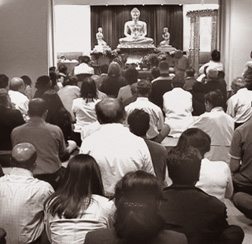|
dailynews |
|
|
|
|
|
OTHER LINKS |

|

|

|
2550 Buddha Jayanthi and the 5th precept
We are supposed to be a society which was built on the foundation of Buddhist values. We proudly talk about it as a gift from our ancestors and our 2000-year old culture. In such a country, it is indeed shameful to read the alcohol consumption statistics.
The average daily consumption of alcohol tops 320,000 litres. This does not reflect uncounted heavy consumption of illicit alcohol. For example, the Excise Department, in the first quarter 2006, detected 7700 cases where alcohol was brewed and sold illegally. Talking of availability, by the end of last year, we had 3308 registered liquor sales outlets in the country. The strangest part is that 20 per cent of them were within Colombo Municipality limits. When analyzing these data, it is quite appropriate to ask ourselves whether we are slowly becoming a nation of drunkards. How much do these tipplers spend for their alcohol? When we consider the fact that the revenue of each Rupee in Government coffers, 21 cents are from taxation of alcohol, we can easily gauge how much of money is spent. On the other hand, the analysis of the trend of hospitalization for selected diseases in Sri Lanka has revealed that there is a marked increase in the rate of patients admitted to hospitals for liver diseases. According to statistics, over 80 per cent of them are related to alcohol consumption. These are indeed shocking revelations. Drinking alcohol is not part of the Buddhist culture, although it seems to have become a widespread phenomenon in our modern society. The fact that something is commonly practised does not necessarily mean that it is good and wholesome. Those who advocate drinking as a factor for promoting "fellowship" forget to take account of the reality that so many "fellowships" have been drowned in those intoxicants. Friendship founded on compassion and mutual understanding is much more desirable than that which is based on alcohol. The brawls and unruly behaviour that often follow the consumption of alcoholic beverages represent an unequivocal testimony of the disgraceful state to which we have been reduced under the influence of intoxicants. The high rate of car accidents connected with reckless driving should also serve as a strong reminder of the danger and undesirability of alcoholic consumption. The Buddha described addiction to intoxicants as one of the six causes of ruin. It brings about six main disadvantages: loss of wealth, quarrels and strife, a poor state of health (liability to diseases), a source of disgrace, shameless and indecent behaviour, and weakened intelligence and mental faculties It would be an exaggeration to say that a man who indulges in alcohol, certainly a one who indulges regularly, has very little right to the sacred name of Buddhist. Similarly, a society which instead of condemning the drinking habit, tolerates it as a harmless manifestation of good fellowship, is not truly Buddhist either. One cannot have one's cake and eat it too. One cannot spend one evening at the bar and the next in the temple - at least not in the Buddhist temple - without grave moral inconsistency, not to say hypocrisy. This often happens in our society. Much less can one pose as a writer or speaker on Buddhism, or as a Buddhist representative or leader, when one's enthusiasm for the sacred cause is stimulated not by study and meditation but by the bottle of liquor. In my thinking, the best way of celebrating the 2550th Buddha Jayanthi is by actual practice of the Buddha's Teaching. That practice must begin with morality; and without abstention from intoxicants, morality itself rests on insecure foundations. In the strategy to tackle the problems associated with alcohol misuse, I believe our focus should be on our younger generation. In my opinion, majority of our older tipplers are beyond recovery. Six reasons are attributed for the likelihood of alcohol addiction in young people: influence of parents, peers and other role models - free and easy availability of alcohol - susceptibility to advertising - glamorization of drinking in tele-dramas and, films - how early in life they begin to use alcohol - their psychological need for alcohol - genetic factors that may predispose them to addiction. It is proven that teenagers become addicted to alcohol quickly. Strict legislative measures can reduce access to alcohol, but it is inadequate to change the behaviour of taking alcohol at a young age. That is why we need a highly focused multiple-targeted- group-oriented, comprehensive package of intervention with different strategies to address the changing complex issues. |
 Alcoholism: President Mahinda Rajapaksa's recent directive to the
Excise Commissioner instructing him to take measures to tighten the
existing excise laws is a laudable move. We saw, in spite of the
prohibition imposed during Vesak period, how certain hotels and
restaurants served liquor to customers. We also saw in newspapers,
subsequently, that successful raids were conducted and over 50
perpetrators nabbed but that was only the tip of the iceberg.
Alcoholism: President Mahinda Rajapaksa's recent directive to the
Excise Commissioner instructing him to take measures to tighten the
existing excise laws is a laudable move. We saw, in spite of the
prohibition imposed during Vesak period, how certain hotels and
restaurants served liquor to customers. We also saw in newspapers,
subsequently, that successful raids were conducted and over 50
perpetrators nabbed but that was only the tip of the iceberg. 








